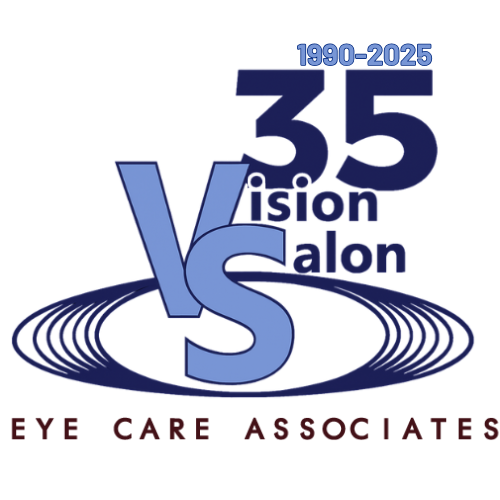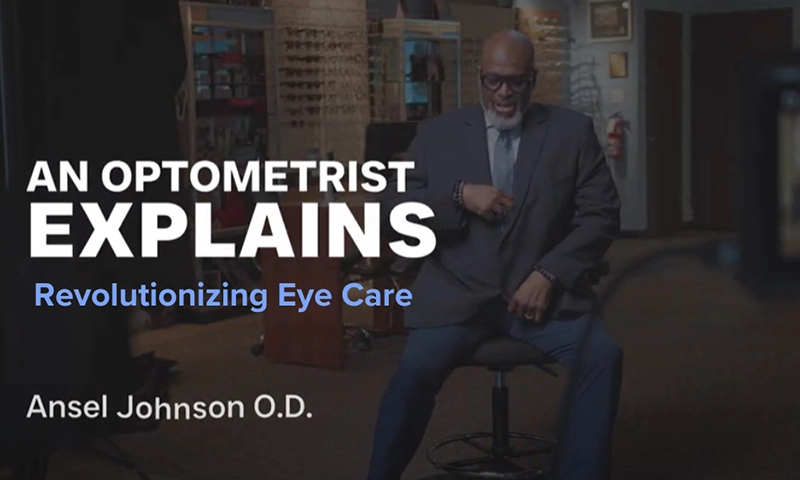Welcome to the first video in our “Optometrist Explains” series, featuring Dr. Ansel Johnson, the Clinical Director of Vision Salon Eye Care Associates. In this series, Dr. Johnson will share his journey and insights into the world of optometry, providing valuable information about eye care and overall health.
Dr. Johnson will cover a range of topics, including the connection between eye care and conditions like glaucoma, hypertension, diabetes, and autoimmune diseases. He will provide tips on lifestyle, medications, and how to engage with healthcare professionals effectively.
You can watch the full video below, or, if you prefer reading, we have provided a complete transcript of the video below.
Video transcription
Why Dr. Johnson chose optometry
My name is Dr. Ansel Johnson, and I am the Clinical Director of Vision Salon Eye Care Associates. I was interested in high school and science and math, and that told me the best combination would be to be a doctor, where I can integrate my love for people and my science interest.
Going on to college, as I was deciding which path to doctorhood I wanted to take, I became interested in optometry because optometry is a primary health care profession. What we’re able to do is link the person’s overall health with their eye health, which goes way beyond just helping people to see with glasses or contact lenses.
The other thing that really interested me in optometry was that it’s one of those professions that don’t come to the forefront when people think about being a doctor. And then I also found out that African American optometrists make up only about 2% of the whole profession.
Representation matters
My mission is, first of all, to inform and empower the communities to take care of themselves. And that communication is so very, very important because studies have shown that Black people do better with Black doctors because representation matters, because we are generally the last to get the benefits of cutting-edge technologies and medications.
And oftentimes we are not informed as well as we should be. Sometimes the vision symptoms that we see or the eye conditions, pain, redness, those can be the very first symptoms that something else is going on that could be possibly even life-threatening or affect your lifestyle.
Diabetes and eye health
We get a lot of referrals for patients who have their eyes examined because they’re living with diabetes. Diabetes is one of the leading causes of blindness in adults in our communities of color.
I’m an individual who is managing my own life and my own health as a patient living with diabetes. I’m also a member of the Association of Diabetes Care and Education Specialists and have been a member for well over 20-25 years. And one of the reasons I decided to do that is that I can bring a level of education and materials to our patients at a little bit higher level, just outside of what eye doctors generally share with patients.
Our journey to being the very first eye care facility in the state of Illinois, and only two eye care facilities in the United States, to become nationally certified in diabetes education has translated into us seeing a lot of patients who had never seen a diabetes educator, and, in most cases, have their insurance cover the cost.
That’s the big barrier that a lot of patients may have in terms of having the cost covered. Then also by being an independent practice having these certified programs, we have a little bit more flexibility in terms of being able to provide these patients with education remotely or, if it’s in person, at evening hours and on Saturdays.
Knoc out Diabetes Program
Our diabetes education program is called KNOC out Diabetes. We’re basically supplementing what their own primary care physicians tell them, what their endocrinologists tell them, what their nurse practitioners will tell them, and we’re providing another point of emphasis, a point of support for our patients, to help them enhance their lives.
Passion for ongoing learning and training
What I love about what I do is that every day I’m evolving, I’m learning, and always trying to pass that on. Technology has always been evolving. Medications, how we manage different eye conditions, has evolved steadily and even more rapidly now. So, I’ve always invested a lot in terms of my own education, even past my graduation and getting my doctorate.
And now we have the opportunity as an externship site for about five different optometry school programs. I’m excited now on the other end of giving back and giving these students an eyeful in terms of how we look at people in the real world, and to manage patients in terms of where their well-being is centered on the patients themselves.
Healthy Living with a Vision
Another area of passion of mine in terms of having an impact in the community at large is our not-for-profit called Healthy Living with a Vision. Our mission is to eliminate healthcare disparities in communities that have historically been underserved, and combine cutting-edge technologies and even clinical trials in our community because communities of color are often underserved in terms of clinical trials. Showing people how lifestyle and their diet can really have a tremendous impact in terms of their overall health.
Connecting eye care to overall health
In this series, I am so excited about sharing some things with our audience in terms of connecting the dots to your eye care with things like glaucoma, connecting the dots with your overall health for things like hypertension and diabetes, and connecting the dots to things like autoimmune diseases, which people don’t think about, can be connected to the eye health and giving people some tips in terms of the lifestyle, medications, what kind of questions to ask, and how to engage their healthcare professionals and their eye doctors.
Ready to take care of your eyes? Schedule an appointment at Vision Salon Eye Care Associates today and get personalized guidance on maintaining healthy vision for you and your family!





